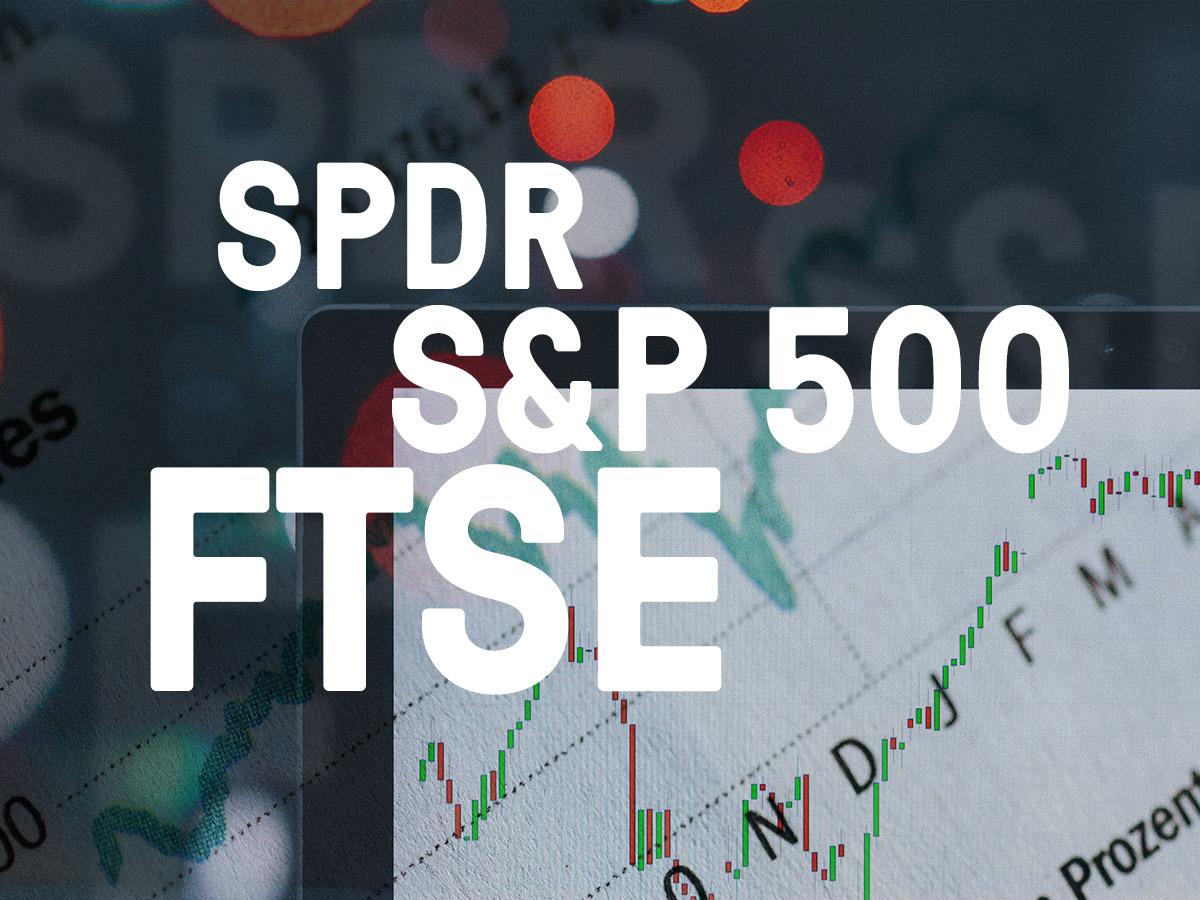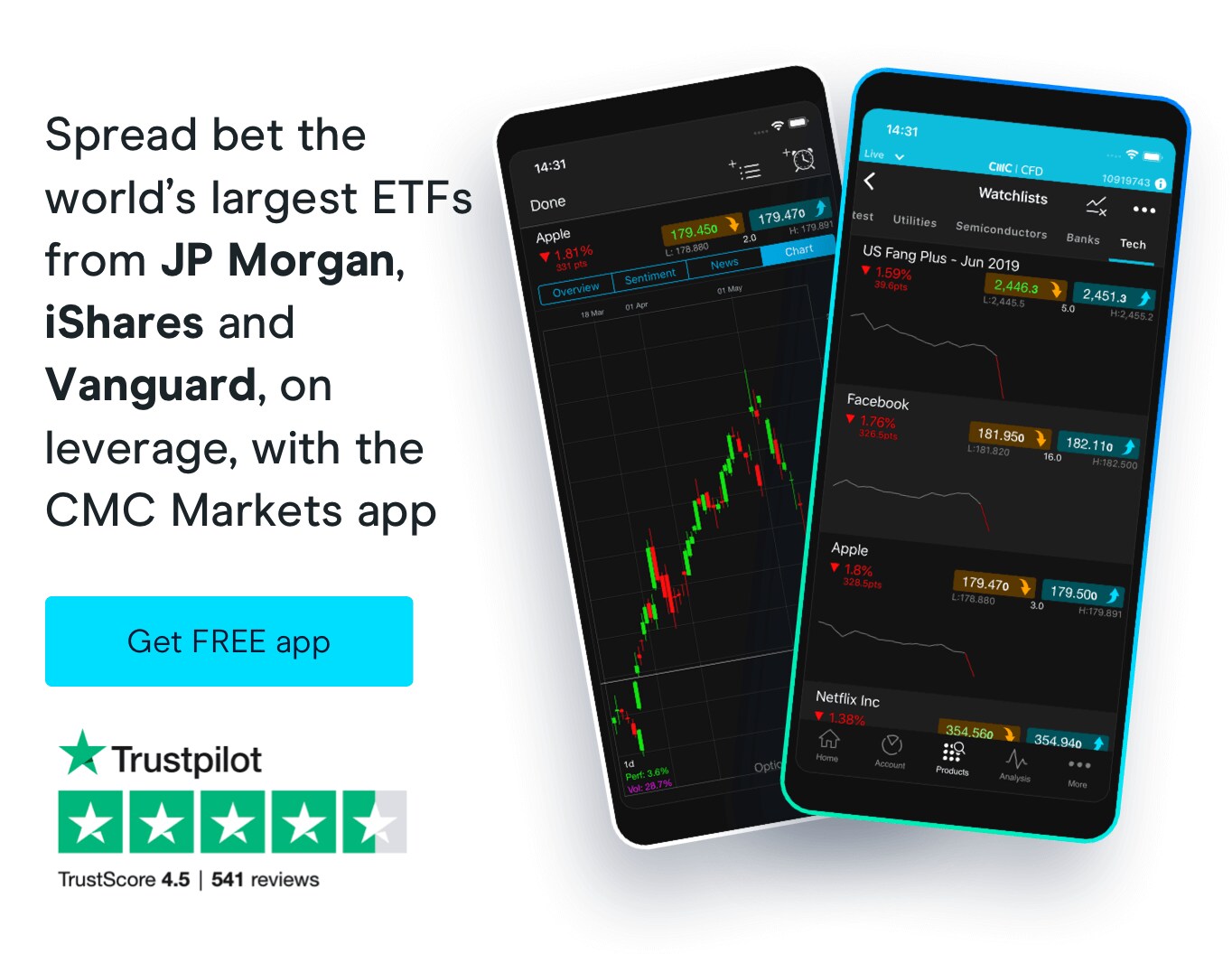With global economic and political concerns keeping uncertainty heightened in financial markets, traders face significant challenges in generating strong income amid the scarcity of yield. One way to try to maximize returns as recession fears, Brexit drama, trade tensions and geopolitical flashpoints in the Middle East ebb and flow, may be to trade exchange-traded funds (ETFs).
ETFs are investment funds that hold a collection of underlying assets, such as shares, commodities and bonds, and they typically use a passive-style investment strategy. ETF portfolios are held by corporations that issue a portion of ownership of the fund, with the shares giving investors exposure to a collection of underlying assets.
For example, in regard to stocks, ETFs can track a broad index like the FTSE 100 or S&P 500, a sub-sector of a particular index or an industry sector, such as financials, commodities or energy. There are also a range of ETFs that are focused on achieving a specific outcome, such as high-dividend returns.
Spread bet the world’s largest ETFs from JP Morgan, iShares and Vanguard, on leverage, with the CMC Markets app:
Why trade ETFs?
There are a number of advantages of investing in and trading ETFs. Perhaps the most obvious is that they can provide a portfolio with an element of diversification. ETFs allow investors to gain exposure to an entire market, country or region with only one trade. They are also a cost-effective investment product, as it only takes one transaction to trade a fully diversified index.
Another key advantage of ETFs is that, particularly with index funds, they aim to disclose their holdings regularly, so investors can see exactly what their positions are at any given time.
ETFs also offer targeted trading, giving investors exposure to a specific portfolio. For instance, techies might go for a smartphone index, while those interested in agricultural commodities could opt for a live-cattle index. Traders can also hedge a specific sector of a broad index ETF. If a trader is long on an ETF tracking the S&P 500 but is concerned that a particular sector within the index will perform poorly, they could find an ETF that tracks the inverse return of that sub-sector.
Trading ETFs on margin with CMC Markets
Like any investment instrument, though, ETFs come with some risks and drawbacks. Liquidity varies between funds, which influences the buy/sell spread when trading. The return on one’s portfolio may also deviate from the return on the index or benchmark tracked, which could be more significant when an ETF employs a strategy other than full replication of the underlying index.
Trading on margin exemplifies the potential benefits and drawbacks associated with ETFs. Taking the margin route has the potential to amplify losses as well as profits. So, how do you know if trading ETFs on margin might be right for your investment portfolio? Let’s take a look at the following example.
An example
Imagine an investor is using one of CMC Markets’ mobile apps to follow pricing data on the SPDR S&P 500 ETF [SPY], which is currently worth nearly 300.00 to buy and the spread is 1.0. To spread bet the equivalent buy amount of £30,000, the investor would need to pay £1 per point. However, if the investor spread bets on margin, given that the margin rate for this particular ETF (for 0 to 2,300) is 20%, only £6,000 would be allocated from the trading account to open a £30,000 position in SPY.
How much would an investor have made a year later if, for example, the price had risen by 10%? Minus the holding costs, which would come to £30,000 x 0.05, (given that it’s 5% per annum for this ETF), the investor would have 1,500 + £1 x 365 (as the investor pays the spread cost for every day of the year that the security is held). That would work out to 1,135, or a gain of 19% on the original investment. That compares to just a 10% increase from the original investment if the investor-owned the shares, and that’s before even considering fund fees, commissions or taxes.
If these potential profits from such a relatively minor initial capital outlay are enough to pique your interest in adding ETFs to your portfolio, CMC Markets offers investors the opportunity to trade the world’s biggest equity ETFs on its platform.
Why CMC?
When it comes to ETFs with the most assets under management, the fund at the top of the list is the SPDR S&P 500 ETF Trust, at $241.61bn. This is followed by the ISHARES Core S&P 500 ETF with $144.49bn, the Vanguard Total Stock Market ETF with $93.76bn, the Vanguard S&P 500 ETF at $93.36bn, the Vanguard FTSE Developed Markets ETF with $65.18bn and the ISHARES MSCI EAFE ETF with $61.66bn.
CMC Markets has made it easier for investors to take advantage of these ETFs through its mobile trading apps, which allow investors to trade anywhere, anytime. The platform also offers benefits such as customizable dashboards, notifications and in-app support. Click on the link below to download CMC Markets’ free trading app. Through CMC Markets, the world’s largest ETFs can, like individual stocks, also be traded by spread betting the indices on margin.
Conclusion
Accessing ETFs can help protect your investment portfolio in times of heightened economic and political risks. They can allow you to amplify returns from indices and make your money work harder, particularly with the passive market so saturated in an environment of low-interest rates.
ETFs offers the following advantages, including:
- Easy diversification and exposure to entire markets, countries and regions
- Cost-effective, as it takes only one transaction to trade a fully diversified index
- Like individual stocks, they can be traded via gearing facilities, including margin loans and contracts for difference
- They aim to disclose their holdings regularly, so investors can see exactly what their positions are at any given time
- They offer targeted trading, providing exposure to specific portfolios and investment preferences
While it’s also important to understand the following risks:
- Depending on the type of ETF traded, special consideration will need to be taken in regard to taxation, as some ETFs will not carry the same tax efficiencies that others. Tax treatment depends on individual circumstances and can change or may differ in a jurisdiction other than the UK.
- Investing in ETFs can lead an individual to shift from being an investor to becoming an active trader, which can add cost as well as liquidity risk while also being very hard to do successfully.
- While ETFs allow for exposure to different markets, countries and regions, this can also act to increase the overall riskiness of a portfolio.
- The ease with which ETFs can be traded can sometimes lead individuals to overlook the fact that their portfolio is becoming riskier.
Leveraged ETFs are complex financial instruments that carry significant risks. Certain leveraged ETF's are only considered appropriate for experienced traders.
Disclaimer Past performance is not a reliable indicator of future results.
CMC Markets is an execution-only service provider. The material (whether or not it states any opinions) is for general information purposes only, and does not take into account your personal circumstances or objectives. Nothing in this material is (or should be considered to be) financial, investment or other advice on which reliance should be placed. No opinion given in the material constitutes a recommendation by CMC Markets or the author that any particular investment, security, transaction or investment strategy is suitable for any specific person.
The material has not been prepared in accordance with legal requirements designed to promote the independence of investment research. Although we are not specifically prevented from dealing before providing this material, we do not seek to take advantage of the material prior to its dissemination.
CMC Markets does not endorse or offer opinion on the trading strategies used by the author. Their trading strategies do not guarantee any return and CMC Markets shall not be held responsible for any loss that you may incur, either directly or indirectly, arising from any investment based on any information contained herein.
*Tax treatment depends on individual circumstances and can change or may differ in a jurisdiction other than the UK.
Continue reading for FREE
- Includes free newsletter updates, unsubscribe anytime. Privacy policy



